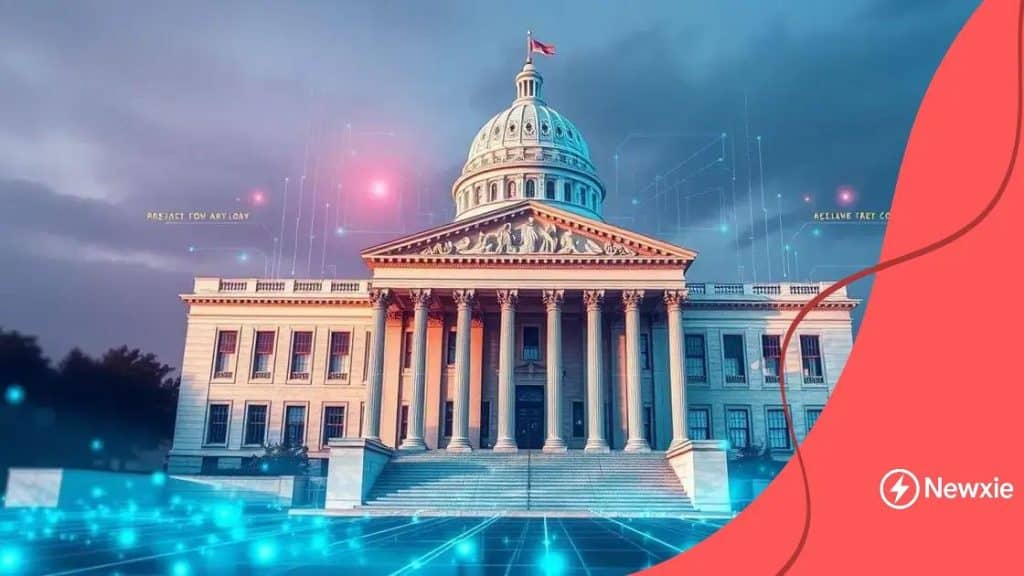Digital rights bill: what you need to know now

Anúncios
The digital rights bill establishes critical user protections, including data privacy rights and freedom of expression, while holding companies accountable for safeguarding personal information.
Digital rights bill is making waves in legislative discussions, raising questions about online freedoms. Have you considered how this impacts your everyday digital life? Let’s dive into its key elements and what they mean for you.
Anúncios
Understanding the digital rights bill
The digital rights bill brings forward essential protections for individuals in the online space. Understanding its key components is vital for everyone who uses the internet today. This legislation aims to ensure that your rights are acknowledged and protected, especially as the digital landscape evolves.
Key Components of the Digital Rights Bill
This bill encompasses various aspects that directly affect users and their online experiences. Here are some important points:
- Protection of personal data against unauthorized access.
- Guarantees freedom of expression in digital platforms.
- Establishes rules for digital content ownership and distribution.
- Ensures transparency in algorithmic decision-making.
As you can see, the digital rights bill addresses essential issues, balancing user protection with the need for innovation. Insights gathered from various stakeholders demonstrate a shift in how society perceives digital rights. The focus is on ensuring that policies remain relevant in a fast-paced technological environment.
Anúncios
Furthermore, the bill advocates for educational programs to enhance users’ understanding of their digital rights. Awareness is key in this matter, as many individuals are unaware of the protections available to them. By educating users, we empower them to make informed decisions regarding their online activities.
Implications for Users
The implementation of the digital rights bill promises to change how users interact with technology. With increased transparency and privacy, individuals can feel more secure while navigating the internet. Online platforms will also be held accountable for upholding these rights, creating a more ethical online environment.
As discussions around this bill continue, it shows the evolving landscape of digital rights. Keeping track of these changes will help users understand their rights and navigate the complexities of the digital world more confidently.
Key provisions and their implications
The digital rights bill outlines several key provisions aimed at enhancing user protection in the online world. These elements are crucial for understanding the implications for individuals and organizations alike. Knowing what these provisions entail can help users navigate their rights more effectively.
Data Privacy Rights
One significant aspect of the bill is the focus on data privacy. This provision allows individuals greater control over their personal information. Users can:
- Request access to their data held by companies.
- Request deletion of their personal data.
- Be informed about how their data is used.
- Opt-out of data collection practices.
Such rights empower individuals and enhance their trust in online services. The approach encourages companies to adopt better data management practices, promoting transparency.
Freedom of Expression Online
The digital rights bill also safeguards freedom of expression. This provision aims to ensure that individuals can express their opinions freely on digital platforms without fear of censorship. It emphasizes the importance of keeping communication open and respectful, even in contentious discussions.
By providing these protections, the bill encourages a more vibrant online discourse. As users become more aware of their rights, they can engage in conversations that matter to them.
Accountability of Online Platforms
Another essential provision focuses on holding online platforms accountable for user content. Platforms are required to:
- Implement measures to prevent harmful content.
- Respond to valid complaints about breaches of user rights.
- Provide users with clear guidelines on reporting content issues.
This accountability fosters a safer online environment. With these responsibilities in place, users can expect a more responsive and ethical treatment of their concerns.
By understanding these key provisions, individuals can better appreciate the implications for their digital interactions. The digital rights bill not only protects users but also sets a framework for companies to operate within, prioritizing ethical practices and user rights.
How the bill affects users and companies

The digital rights bill significantly impacts both users and companies, creating a ripple effect across the online ecosystem. Understanding these effects is crucial for everyone engaged in digital activities.
Empowering Users
One of the most notable ways the bill affects users is by empowering them with enhanced rights. Users gain more control over their personal data and can demand transparency from the companies that handle their information.
- Users can access the information that companies store about them.
- They have the right to request deletion of their data at any time.
- Users will receive clear disclosures regarding how their data is used.
This empowerment can lead to increased trust between users and online platforms, fostering a more secure digital environment.
Impact on Companies
The digital rights bill also places new responsibilities on companies. Organizations must adapt their practices to comply with the law, ensuring user rights are upheld. This adaptation might include:
- Implementing stronger data protection measures.
- Training staff to recognize user rights and respond appropriately.
- Establishing clearer privacy policies that are accessible to users.
Companies that prioritize compliance not only avoid legal penalties but may also enhance their reputation among consumers who value privacy and transparency.
Moreover, businesses may need to invest in technology that facilitates the management of user data and automates requests for information. This transition can be costly but is essential for maintaining customer loyalty and trust.
A New Competitive Landscape
The implementation of the digital rights bill may also shift the competitive landscape. Companies that innovate in privacy and user rights may find themselves at an advantage. They can attract customers by reinforcing their commitment to transparency and user empowerment.
As users become more aware of their rights, they are likely to choose platforms that respect those rights. This shift could reward companies that proactively adapt to the new legal framework while penalizing those that do not.
Understanding how the bill affects both users and companies is vital in today’s digital age. As the digital rights bill continues to unfold, vigilance and adaptability will be key for all stakeholders involved.
Global perspectives on digital rights
Global perspectives on digital rights showcase differing views on how these rights should be protected and implemented. Each country or region has its unique approach based on cultural, political, and technological contexts.
Regional Variations
In Europe, the General Data Protection Regulation (GDPR) sets a high standard for personal data protection. This stringent regulation focuses on giving users control over their data, and it has inspired similar legislation in other parts of the world.
- GDPR mandates clear consent for data collection.
- It emphasizes the importance of user data privacy.
- Violations can result in significant fines for companies.
On the other hand, some regions may have less comprehensive laws. In the United States, for example, regulations can vary from state to state. This can lead to a patchwork of protections for users. Advocates for strong digital rights in the U.S. are pushing for a more unified approach to data privacy.
Developing Nations
In developing countries, the focus on digital rights often intersects with issues of access and connectivity. Many individuals lack reliable internet access, which directly impacts their ability to exercise their rights online. Organizations are working to bridge this gap and ensure that everyone can engage in the digital world.
- Efforts include providing affordable internet access.
- Establishing community programs to educate users about their digital rights.
- Advocating for policies that protect users in low-connectivity areas.
Moreover, in some areas, digital rights are critical in the fight against authoritarian regimes. Activists often work to promote freedom of expression and fight against censorship. These efforts highlight the importance of international solidarity in advocating for universal digital rights.
The Role of Global Organizations
Global organizations, like the United Nations, play a key role in promoting and protecting digital rights worldwide. They provide platforms for dialogue and encourage countries to adopt best practices through treaties and conventions.
By assessing how different nations approach digital rights, we can learn from each other and work towards a more equitable digital landscape. Understanding various perspectives helps illuminate the paths towards better protections for users around the globe.
Future trends in digital rights legislation
The future of digital rights legislation looks dynamic and evolving. As technology continues to advance, so too do the laws that govern digital interactions. Understanding these trends will help individuals and businesses prepare for the changes ahead.
Increased Focus on Data Privacy
One significant trend is the increased focus on data privacy. With more data breaches occurring, users are demanding stronger protections for their personal information. Governments are likely to respond by implementing stricter regulations that hold companies accountable for data security.
- New laws may require companies to disclose breaches within a specified timeframe.
- Fines for data mishandling could become more severe.
- Data minimization practices will be emphasized, encouraging companies to collect only what’s necessary.
This shift reflects a growing recognition of the importance of trust in digital services. Users want assurances that their information is safe.
Global Collaboration
As digital issues transcend borders, global collaboration on digital rights is becoming essential. Countries will need to work together to address challenges such as cybersecurity and online privacy effectively. Key initiatives may include:
- International treaties to establish common standards for data protection.
- Collaborative efforts to combat cybercrime.
- Sharing best practices for digital governance.
This cooperation can enhance the effectiveness of laws and expand protections for users worldwide.
Legislation Adapting to New Technologies
Additionally, legislation will need to adapt to emerging technologies like artificial intelligence and blockchain. As these technologies transform how we interact online, they also raise new questions about rights and responsibilities.
For instance, regulations may need to address:
- The ethical use of AI in decision-making processes.
- Privacy issues related to blockchain transparency.
- Ensuring accountability for automated systems.
By addressing these aspects, lawmakers can create a regulatory environment that supports innovation while safeguarding user rights.
Empowering User Education
Another trend is the emphasis on empowering users through education. As people become more aware of their digital rights, they will be better prepared to advocate for themselves. Educational programs can help people understand:
- Their rights regarding data privacy.
- How to protect their personal information online.
- The implications of new technologies on their rights.
Informed users are more likely to engage proactively with technology and demand the rights they deserve.
Overall, the future of digital rights legislation will involve a multifaceted approach, incorporating global collaboration, technological adaptation, and user empowerment. These trends will shape a digital environment where rights are increasingly recognized and protected.
FAQ – Frequently Asked Questions about Digital Rights Bill
What is the digital rights bill?
The digital rights bill is legislation that aims to protect user rights online, focusing on data privacy, freedom of expression, and accountability of companies.
How does the bill empower users?
The bill empowers users by giving them more control over their personal data, allowing them to access, delete, and understand how their information is used.
What impact does the bill have on companies?
Companies are required to comply with stricter regulations regarding data protection and must implement practices that prioritize user privacy.
How can I stay informed about my digital rights?
You can stay informed by following updates from reliable sources, engaging with community educational programs, and understanding the laws that apply to your region.





